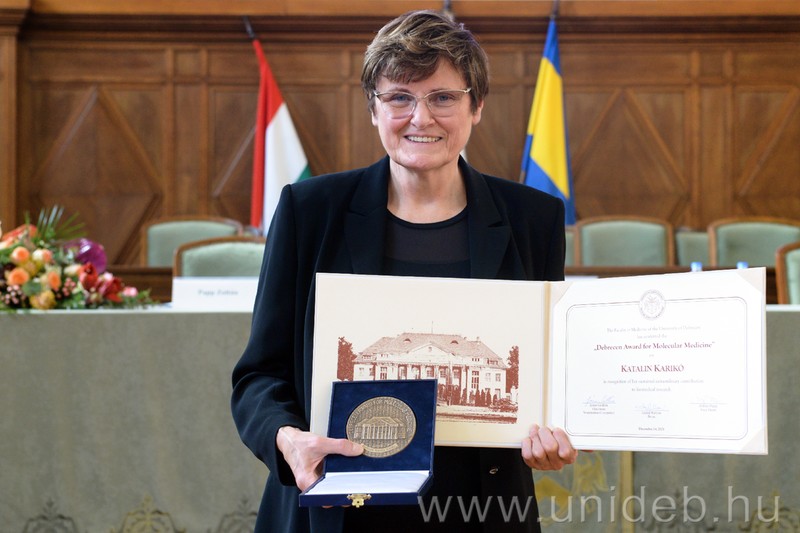The state-of-the-art holographic device, which was purchased by the Biomechanics Laboratory of the University of Debrecen with the amount donated by Katalin Karikó, makes more precise surgical interventions possible. The research biologist, the patentee of synthetic mRNA-based vaccine technology, donated part of the money awarded by the Debrecen Prize for Molecular Medicine to support the laboratory’s activities.
With the acquisition of the device, a new era began in the life of the laboratory
– declared Professor Zoltán Csernátony, head of the Department of Orthopedics and the Biomechanics Laboratory of UD.
HoloLens is a wireless self-contained holographic device, a special pair of glasses. With its help, we can place ourselves in the so-called mixed reality, when elements of the real and virtual world are visible at the same time. The device can be a significant help, especially during surgery.
Projecting the virtual and real images on each other with the preliminary data acquisition based on the CT scan allows us to “see inside” the patient. During surgery, only very few of the bones are visible, and many are covered, but using the device, the operating doctor can access a 3D model of the area affected by the surgery, such as the pelvis, reconstructed on the basis of the patient’s CT scan. It enables a more accurate and precise intervention
– explained the professor.
During surgery, the surgeon controls the system directly with his hands and fingers without using an external controller and can touch, zoom in, and zoom out the virtual 3D models.
The staff of the Biomechanics Laboratory would like to improve the software of the device. Zoltán Csernátony put it this way: with innovation, they can contribute to the unparalleled development of surgery. The improved device could replace extremely expensive and difficult-to-use navigation devices.
The essence of the development would be for the operating doctor to see exactly where the drilling and cutting should be done by projecting the 3D model and the real bones on top of each other during surgery. The HoloLens would orientate the surgeon’s movements in the pre-planned ideal direction with visual feedback and the use of a special device connected to it with vibration. At the same time, it must be taken into account that it is a very complicated task to overlap and register the virtual and actual reality in such a way that it corresponds to the precision required for the operations
– emphasized Sándor Manó, a scientific associate of the laboratory.
Katalin Karikó used the 10,000 euros awarded by the Debrecen Prize for Molecular Medicine to support the Biomechanics Laboratory as well as the National Academy of Scientists, which deals with talent management.
The tools of the Biomechanics Laboratory can be used both in research and in patient care. László Mátyus, dean of the Faculty of Medicine, told hirek.unideb.hu that the donation gives us another hope in overcoming the difficulties in our environment – which also threaten the operation of the laboratory.
The professor added: since 2003, every year since 2003, the work of scientists who have achieved outstanding results in the field of molecular medicine has been recognized. Among them, Katalin Karikó was the first to donate the amount of the award.
unideb.hu



















